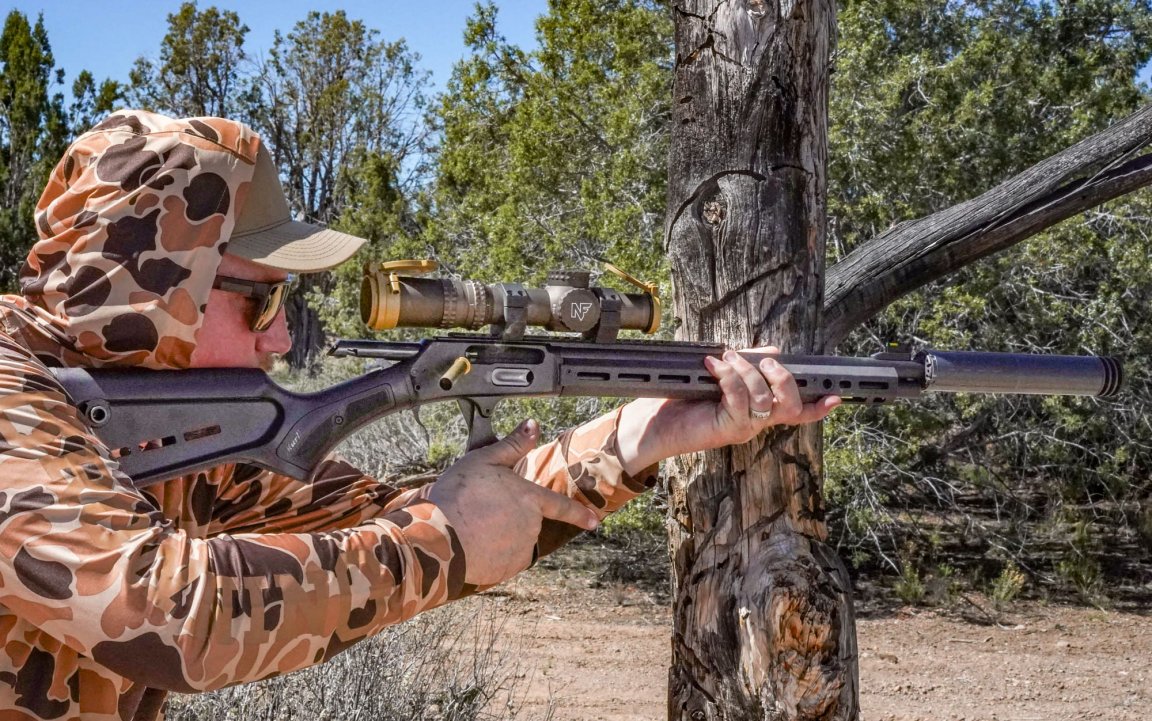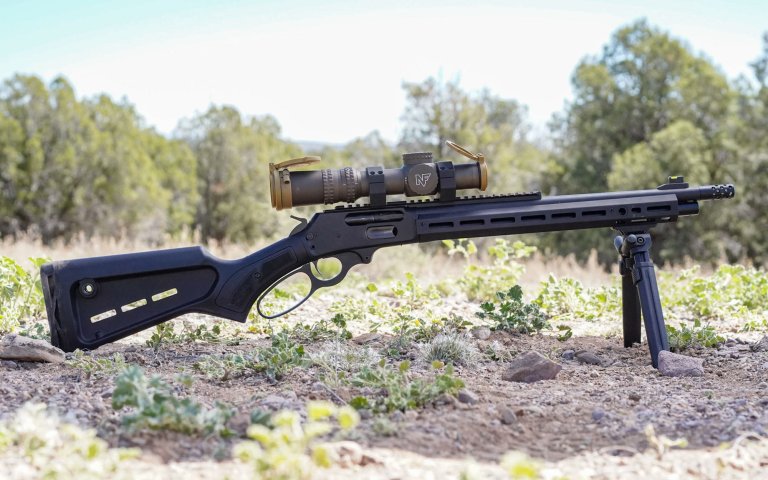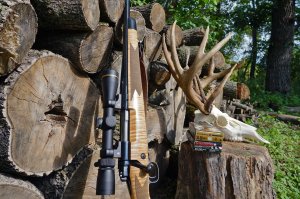We may earn revenue from the products available on this page and participate in affiliate programs. Learn More ›
The staying power of lever-action rifles and the .45-70 Gov’t cartridge is nothing short of remarkable given all that’s transpired since they were introduced. Once again, Marlin has combined these two creations of the 1800s and, in the process, has trotted out yet another fabulous rifle and achieved an interesting milestone.
The milestone is as quaint as it is surprising. The Marlin Dark Series Model 1895 is the company’s first lever gun to wear something other than a wood stock — a fact that took me aback when it was pointed out given the ubiquity of synthetic stocks today. The butt is made from a nylon-reinforced polymer while the machined aluminum fore-end feels more like a handguard from a chassis rifle or AR than typical lever-gun furniture.
The use of these new materials works, both with respect to the rifle’s post-apocalyptic aesthetics and its functionality. The Marlin Dark Series Model 1895 is rugged and good-looking and is an ideal thumper for hogs, deer in thick timber, protection against bears, and all-around survival tasks.
Marlin Dark Series Model 1895 Specs
- Action: Lever action
- Stock: Synthetic butt with aluminum handguard
- Cartridge: .45/70 Gov’t
- Capacity: 5+1
- Weight: 6 pounds 13 ounces (measured)
- Trigger: 6 pounds 4 ounces (measured)
- Barrel: 16.17 inches, 1:20 twist, threaded 11/16-24
- Length: 35.5 inches
- Price: $1,429
Key Features
- Durable all-weather construction
- M-Lok mounting slots on forend and butt stock
- QD sling attachment points
Review Highlights
- Very good fit and finish on parts and quality craftsmanship
- Highly configurable for accessories and customization
- Excellent ergonomics
- Accuracy: 1.284 inches (average of 24 five-shot groups at 50 yards)

Running the Marlin Dark Series Model 1895
The Dark Series was one of the firearms included in this year’s Best Rifle Test. We shot it alongside a bevy of other new guns (including the impressive Smith & Wesson Model 1854) and it stood out as one of our favorites. As with other Marlins we’ve tested, like the 1895 SBL, the action is smooth and the gun balances well.
Marlin equipped the Dark Series 1895 with a medium-sized lever loop that is broader along the bottom. The generous opening of the loop easily accommodates the shooter’s hand (even when gloved) yet is faster to run than an oversized lever loop because the hand can maintain contact with the loop while pulling the trigger. (With an oversized loop the shooter’s hand must move through the loop’s interior before contacting the metal, costing time.)
The broad bottom of the loop provides extra contact between the back of the shooter’s trigger hand, making it more comfortable than traditional, narrow loops — especially when running the gun hard and fast.
The trigger on our sample was pretty good. It had just a hint of creep before coming up against a solid back wall, and broke at 6 pounds 4 ounces, which isn’t bad for an 1895-pattern gun.
Even though the .45/70 is a bit of a thumper, we had no issues managing the rifle’s recoil. It comes with a radial muzzle break that barks loudly but tames the kick to a notable degree. The recoil pad isn’t overly squishy but it, too, helps dampen the rifle’s recoil. Lastly, even though the fore-end lacks checkering, it is easy to grasp and provides a fairly solid anchor for the lead hand, which also helps with controlling the rifle.
The muzzle on the Marlin’s 16.1-inch barrel is threaded 11/16-24, and we were able to screw on a suppressor, which is how we did most of our shooting. With that bit of extra weight out front, and the reduction in muzzle blast, the rifle became even more pleasant to shoot.
We ran the rifle hard during our evaluation, performing mag dumps on steel and paper targets. I could say that we did this to get a feel for the Marlin’s qualities — which isn’t a lie — but equally we just had a blast pulling the trigger on the gun, which is a testament to how shootable it is.
The one downside of making all that noise and empty brass was that the rifle got hot. Heat from the barrel transferred to the metal fore-end and we either needed to wear gloves to keep shooting or allow the rifle to cool down between the drills. We can’t really ding the rifle for this because the volume of shooting we did was, frankly, unreasonable and unless you’re repelling an army of alien invaders, you’d never need to shoot it that much that rapidly.

Sighting Options for the Marlin Dark Series Model 1895
From the factory, the rifle comes with a ghost-ring rear aperture sight and a bold green fiber-optic front sight. It is an effective combo, but Marlin put a big Picatinny rail on the rifle for a reason. The rail extends several inches in front of the receiver and has a lot of real estate for mounting optics.
I put a Nightforce ATACR 1-8×24 F1 on the rifle and it paired with the Marlin like they were made for each other. There’s nothing you’d want to do with a .45-70 that a 1-8X can’t handle and the reticle in that optic is useful at every magnification level.
Dialed back to 1X the sight picture gives you three bold stadia (left, right, and below) to center around the target, and as you dial up in magnification the central aiming ring and holdover marks come into view.
I mounted the scope with low rings from Seekins Precision. That was to maintain the proper relationship between the stock and optic. The rifle’s drop at the comb is designed to align the eyes with the iron sights, so putting the optic as low as possible on the rail makes sense. With higher rings, the shooter’s face will float above the stock and you won’t get a good cheek weld unless you add a pad to the comb.
The downside to the low-mounted scope is that I had to remove the aperture sight from the rear of the rail to accommodate the ocular bell on the Nightforce. The scope being low also makes accessing the hammer a bit more difficult, but as with all Marlins, the rifle ships with a thumb spur you can add if you find cocking the hammer bothersome.
While a LPVO scope is a smart choice, a simple red dot sight would also work well on the rifle, and you could also use the Pic rail to mount some type of night vision or thermal unit too.

Dark Series 1895 Accuracy
The rifle and scope delivered the best accuracy with Barnes 300-grain TSX ammunition. A 20-shot group (calculated by overlaying four five-shot groups) measured .99 inches and had a mean radius of .36 inches. We shot the rifle standing, supported by a bag on a tripod at 50 yards to gather this data. Incidentally, that bullet is an absolute hammer for deer, elk, bear, feral hogs, or moose. I’ve used that load on a handful of critters over the years and it is extremely effective.

Suitability for Accessories
In addition to the Pic rail, the handguard on the rifle has multiple slots cut in it to mount M-Lok accessories. Lights, lasers, an espresso machine — all could be accommodated on the fore-end.
The buttstock, made of nylon-reinforced polymer, is thinned out in the middle and bears more than a passing resemblance to the boat-paddle Zytel-stocked Ruger M77s of years gone by. The thinned-out section has three M-Lok slots to mount a cartridge carrier or other add-ons.
Marlin Dark Series Model 1895 Ergonomics
The functioning of the rifle — beyond what I’ve already described — earned it high marks in the evaluation as well. It loads easily and didn’t pinch our fingers as we stuffed it full of shells.
The cross-bolt safety, standard on Marlins now for many decades, is easy to manipulate between safe and fire. Though you should know that if you have the rifle on safe and you cock the rifle and pull the trigger, the hammer will drop with a click rather than a bang. This has saved the hide of more than one deer over the years.

Pros and Cons
There’s a lot to like about this rifle but it is still a niche offering and won’t be ideal for everyone.
- Pros: The craftsmanship on this rifle is excellent. The fit and finish are top-notch, and it runs extremely well. Aesthetically, it nails the tacti-cool look.
- Cons: It’s a bit expensive. The aperture sight needs to be removed to run most scopes on it.
Final Thoughts on Marlin’s First Tactical Lever Action
This rifle is a significant departure from the traditional Marlin factory offering. While there’s been an eager audience for tricked-out tactical lever actions, Marlin hasn’t really gone all-in on the category prior the Dark Series Model 1895.
Given the appetite for guns like this, however, Marlin foray into this market is a safe bet. The rifle shoots well, is built to take a beating and stay reliable, and looks bad ass. I think even lever-gun purists are going to be attracted to this rifle and tempted to slide over to the dark side.


